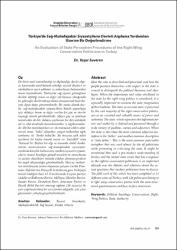Türkiye’de sağ-muhafazakâr siyasetçilerin devleti algılama yordamları üzerine bir değerlendirme
Citation
Suveren, Y. (2014). Türkiye’de sağ-muhafazakâr siyasetçilerin devleti algılama yordamları üzerine bir değerlendirme. Anadolu Üniversitesi Sosyal Bilimler Dergisi, 14 (4), 139-151.Abstract
Devletin nasıl tanımlandığı ve algılandığı, devlet olgusu karşısında nasıl konum alındığı siyasal düşünce ve
ideolojilerin ayırt edilmesi ve anlaşılması bakımından
önem taşımaktadır. Türkiye’de sağ siyaset geleneğinin
devlete atfettiği önem ve değer söz konusu olduğunda
bu geleneğin devlet tahayyülünü soruşturmak başlı başına ilgiye değer görünmektedir. Bir entite olarak devlet, sağ-muhafazakâr siyasetçilerin büyük çoğunluğu
için oldukça önem ve değer verilen bir güç ve otorite
kaynağı olarak görülmektedir. Meşru güç ve otoriteyi
temsil eden devlet, oldukça çeşitlenen bir dizi mitolojik
ad ve sıfat etrafında tanımlanmakta ve algılanmaktadır. Devlet tanımlanırken en sık müracaat edilen sıfatmecaz onun “baba” oluşudur; yaygın kullanılan tipik
tamlama ise “devlet baba”dır. Bu mecaza eşlik eden
ayrılmaz bir başka önemli unsur ise “kutsallık” veya
“kutsiyet”tir. Böylesi bir algı ve bununla ilintili devletotorite tasavvurunun sağ-muhafazakâr siyasetçiler
nezdinde karşılık bulmasının, modern siyasetin siyasetçilerin önüne koyduğu güncel meselelerin tartışılması
ve çözüm olasılıkları önünde ciddiye alınması gereken
bir engel oluşturduğu görülmektedir. Mevcut makalenin üretilmesine zemin oluşturan çalışma Devlet Planlama Teşkilatı’nın Düzey II. kriterlerine göre Türkiye’yi
temsil niteliğini haiz 13 il merkezinde 6 siyasi partiye
(Adalet ve Kalkınma Partisi, Milliyetçi Hareket Partisi,
Saadet Partisi, Demokrat Parti, Anavatan Partisi ve
Büyük Birlik Partisi) mensup toplam 126 siyasetçi ile
yarı-yapılandırılmış bir soru formu eşliğinde, yüz yüze
görüşmeler yoluyla gerçekleştirilmiştir. How the state is described and perceived, and how the
people position themselves with respect to the state is
crucial to distinguish the political decisions and ideologies. When the importance and value attributed to
the state by the right-wing politics is considered, it is
especially important to examine the state imagination
of this tradition. The state, as an asset area, is perceived
by the vast majority of the right-conservative politicians as an essential and valuable source of power and
authority. The state, which represents the legitimate power and authority, is defined and perceived through a
wide variety of qualities, names and adjectives. When
the state is described the most common adjective-metaphor is the “father” and another common description
is “state father”. This is the most common paternalist
metaphor that was used almost by the all politicians
while promoting or criticizing the state. It might be
mentioned that such a pre-modern understanding of
history and the related state vision that has a response
in the rightist-conservatist politicians is an important
obstacle over the debates and solutions about the actual questions that modern politicians have to discuss.
The field work of this article has been completed in 13
different cities of Turkey; with 126 politicians belong to
6 right wing-conservative parties with the semi-structured questionnaires and face-to-face interviews.
Source
Anadolu Üniversitesi Sosyal Bilimler DergisiVolume
14Issue
4Collections
- Cilt.14 Sayı.4 [12]


















